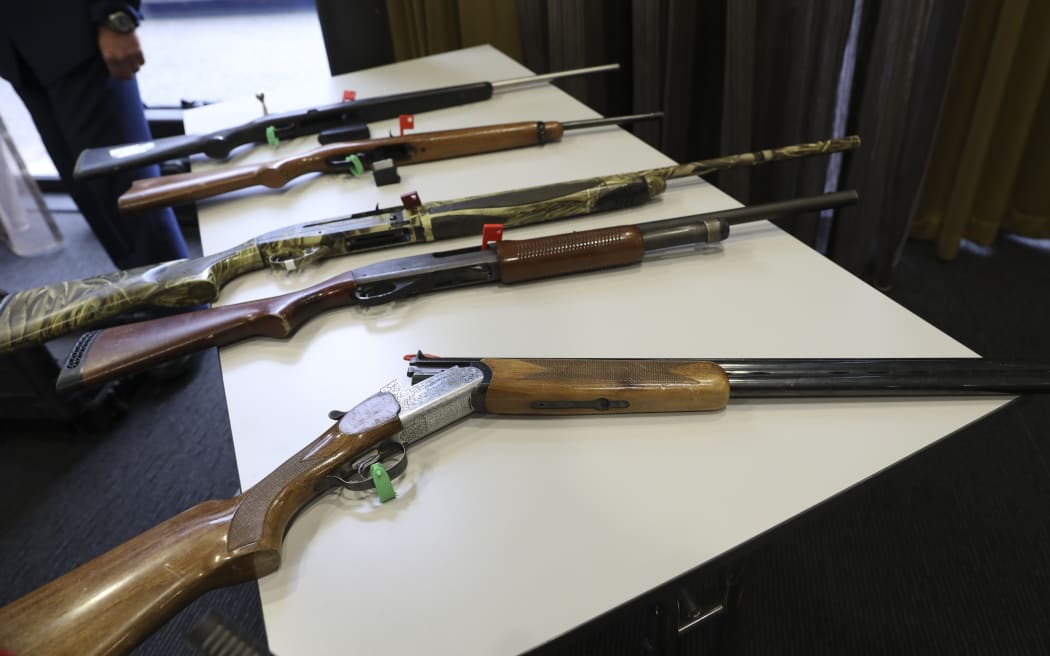The long-awaited firearms registry won't capture the guns held by gangs, but it will make it harder for weapons to hit the black market.

The firearms registry is the latest in a swathe of policies rolled out to increase public safety following the March 15th mosque attacks. Photo: RNZ / Ana Tovey
One of the biggest pieces of New Zealand's gun law reform puzzle is about to fall into place.
More than four years after the Christchurch mosque attacks, the firearms registry goes live this weekend.
All gun owners will be required to upload details of their firearms to the registry. They'll have five years to do this, unless one of the "activating circumstances" applies - if so, they'll need to register the firearms sooner.
Firearms Safety Authority executive director Angela Brazier says it's an important moment, given the Royal Commission of Inquiry's recommendation to strengthen firearms legislation.
"I think many New Zealanders would be surprised to know that we don't currently know how many [guns] licence holders have and where they are around the country," she tells The Detail.
"Once the registry goes live, for the first time we'll have visibility of the lawfully-held firearms in our country, including how many there are and where they are in our communities.
"We'll know when those guns move between people, we'll also know when dealers are selling firearms. We'll immediately be notified that a sale has happened from a dealer and we'll be able to follow-up with the purchaser."
What the register won't capture is unlawfully-held guns.
"There are obviously firearms in the hands of criminals and gangs, but the registry will make it harder for lawfully-owned firearms to be diverted into the black market," Brazier says.
"We all want less gun crime in our communities and the registry will help us with that."
If a firearm is stolen, the owner needs to report it to the Firearms Safety Authority immediately. If that firearm turns up at a crime scene later on, it'll be able to be identified with the serial number and details held on the register.
Journalist Charlotte Graham-McLay has covered New Zealand's gun law reforms for overseas publications like The New York Times and The Guardian. She's also writing a book about the mosque shootings.
Then-prime minister Jacinda Ardern was able to push through a number of changes quite quickly in the aftermath of the events of March 15, 2019, such as the ban on military-style semi-automatic weapons.
"She wasn't saying 'we might do this, we want to see how people feel about doing this', or even 'we're proposing to do this'. I remember the headline of the press release was, 'New Zealand bans military-style semi-automatics and assault rifles'," Graham-McLay says.
"It was already a done deal and I think that was part of what was really key for actually getting it over the line, they almost had one shot at being able to do one thing very quickly while the country felt the way it did.
"Part of the reason they had to do it that quickly was to prevent stockpiling of such weapons of course; if this process had dragged out for months, that would have been quite a different prospect. They also had a lot of backing - they'd spoken to National, they'd spoken to other parties and other than the ACT Party, everyone was in favour of it."
Graham-McLay explains that many of the gun law reforms that have happened since the mosque shootings have been proposed in the past.
"We actually had a gun register before the 1980s in New Zealand and that was done away with in favour of a system where we instead licensed the person owning the weapons.
"We relied on the idea that if we assess this person as having a fit and proper character to own firearms, that that was the best way to ensure firearms safety."
But a comprehensive review of gun laws in 1997 made a number of recommendations to strengthen them, including implementing a register.
"There were multiple attempts under successive governments to put this on the table."
Graham-McLay says it's difficult to work out why these attempts at reform never made it across the line.
"If you go back, you see a lot of quotes from politicians talking about priority, it wasn't considered a priority at the time.
"I think what they meant was that the amount of opposition it was going to provoke did not feel worth it for the actual level of threat or risk that, for whatever reason, they felt there was in New Zealand."
People can find information about the firearms register on the Firearms Safety Authority's website.
Check out how to listen to and follow The Detail here.
You can also stay up-to-date by liking us on Facebook or following us on Twitter.

Photo:



